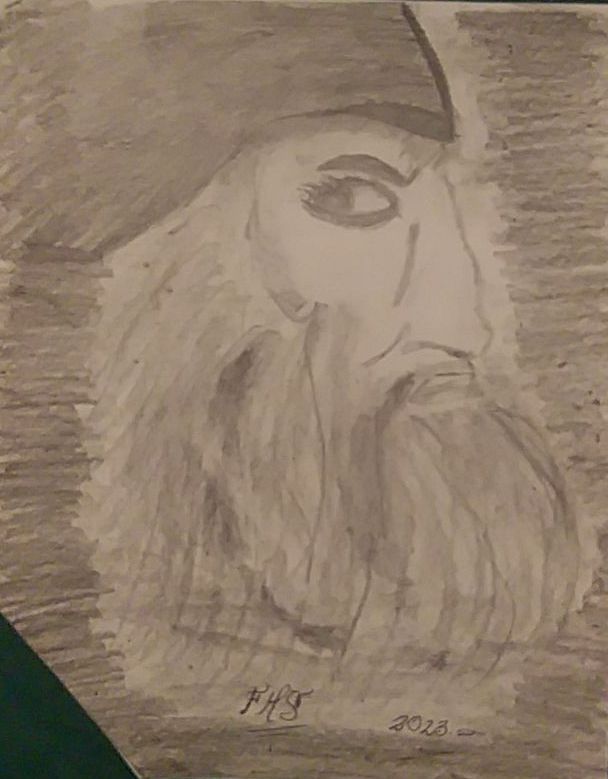
Dibujo realizado por el autor.
Título: El Renacimiento: Período de transformación, transición y cambios. Por Florencia Renata.
El Renacimiento se trató de un período histórico caracterizado por la renovación, innovación y transformación de los principios de expresión de la humanidad con las artes, la literatura y la ciencia. Tuvo lugar a mediados del siglo XV extendiéndose hasta finales del siglo XVI, pero también es posible que sus inicios se sitúan a finales del siglo XIV. Comenzó en Italia, arropando a toda Europa adoptando características de cada nación. Su eje fue el ser humano y todo lo relacionado con éste, rompiendo de ese modo con todos los estándares que habían regido las sociedades hasta ese momento.
La etapa más destacada del Renacimiento fue su desarrollo en las bellas artes como base principal, de ese modo el hombre y las naciones se enfocaron en desenvolverse y disfrutar la vida de manera plena y más libre. En este tiempo se hicieron más notables las muestras del ingenio humano con grandes inventos, como la brújula, y el astrolabio que ayudó a los navegantes a encontrar nuevas rutas no navegadas hasta el momento.
Los desarrollos náuticos permitió a la humanidad aprender más sobre geografía universal: Vasco de Gama dio la vuelta al Cabo de Buena Esperanza; Cristóbal Colón descubrió América y Fernando de Magallanes encabezó una expedición que le dio la vuelta al mundo. Estos logros abrieron nuevas rutas de riqueza comercial, garantizando de ese modo la inversión necesaria para sostener las artes y las ciencias.
Descubrimientos impactantes como: Nicolás Copérnico abrió las puertas a otro mundo de ideas al afirmar la teoría del Sol como centro del Universo, y no la Tierra. Otro adelanto de importancia fue el empleo del método científico. La rebeldía del hombre lo empujó a no conformarse con las antiguas creencias. Se aprendió a comprobar tanto las viejas como las nuevas ideas a base de una minuciosa observación y por medio de experimentos prácticos relacionados con aparatos científicos.
Las nuevas ideas así como los descubrimientos del Renacimiento tuvieron una dispersión más rápida en virtud de inventos como la imprenta de tipo movible; de ese modo los libros fueron más fáciles de hacer, su costo era menor y eran leídos más extensamente. A pesar de todas sus glorias fue un tiempo con muchos puntos oscuros, creando grandes desigualdades sociales. El Renacimiento se fue desplazando hacia el Norte, a través de Europa, y llegó finalmente a Inglaterra. Se considera que se extinguió en este país con la muerte de la reina Isabel I, en 1603.

Drawing by the author.
English: Title: The Renaissance: Period of transformation, transition and changes. By Florencia Renata.
The Renaissance was a historical period characterized by the renewal, innovation and transformation of the principles of expression of humanity with the arts, literature and science. It took place in the middle of the fifteenth century extending until the end of the sixteenth century, but it is also possible that its beginnings are located at the end of the fourteenth century. It started in Italy, covering the whole of Europe adopting characteristics of each nation. Its axis was the human being and everything related to it, thus breaking with all the statuses that had governed societies up to that time.
The most outstanding stage of the Renaissance was its development in the fine arts as the main basis, thus man and nations focused on developing and enjoying life fully and more freely. At this time, the samples of human ingenuity became more remarkable with great inventions, such as the compass, and the astrolabe that helped navigators to find new routes not navigated so far.
Nautical developments allowed humanity to learn more about universal geography: Vasco de Gama circled the Cape of Good Hope; Christopher Columbus discovered America and Ferdinand Magellan led an expedition that circumnavigated the world. These achievements opened new routes of commercial wealth, thereby guaranteeing the necessary investment to sustain the arts and sciences.
Shocking discoveries such as: Nicolaus Copernicus opened the doors to another world of ideas by affirming the theory of the Sun as the center of the Universe, and not the Earth. Another important development was the use of the scientific method. The man's rebelliousness pushed him not to conform to the old beliefs. It was learned to test both old and new ideas based on careful observation and through practical experiments related to scientific devices.
New ideas as well as the discoveries of the Renaissance had a faster dispersion by virtue of inventions such as the movable-type printing press; in that way books were easier to make, their cost was lower and they were read more widely. Despite all its glories it was a time with many dark spots, creating great social inequalities. The Renaissance was moving northwards, through Europe, and finally reached England. It is considered to have become extinct in this country with the death of Queen Elizabeth I, in 1603.
Nota: presente entrada, es de mi autoría y fue publicada anteriormente en mi blog de Hive.
Congratulations, your post has been curated by @r2cornell, a curating account for @R2cornell's Discord Community.